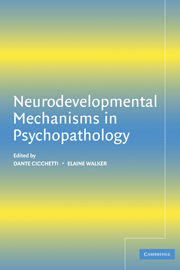Book contents
- Frontmatter
- Contents
- List of Contributors
- Preface
- NEURODEVELOPMENTAL MECHANISMS IN PSYCHOPATHOLOGY
- Part One Basic Mechanisms in Prenatal, Perinatal, and Postnatal Neurodevelopmental Processes and Their Associations with High-Risk Conditions and Adult Mental Disorders
- Part Two Animal Models of Neurodevelopment and Psychopathology
- Part Three Models of the Nature of Genetic and Environmental Influences on the Developmental Course of Psychopathology
- Part Four The Neurodevelopmental Course of Illustrative High-Risk Conditions and Mental Disorders
- 17 Neurobiology of Personality Disorders: Implications for a Neurodevelopmental Model
- 18 Genesis and Epigenesis of Psychopathology in Children with Depressed Mothers: Toward an Integrative Biopsychosocial Perspective
- 19 The Neurobiology of Child and Adolescent Depression: Current Knowledge and Future Directions
- 20 Psychosocial Stressors as Predisposing Factors to Affective Illness and PTSD: Potential Neurobiological Mechanisms and Theoretical Implications
- 21 Neurohormonal Aspects of the Development of Psychotic Disorders
- Index
- References
20 - Psychosocial Stressors as Predisposing Factors to Affective Illness and PTSD: Potential Neurobiological Mechanisms and Theoretical Implications
Published online by Cambridge University Press: 10 August 2009
- Frontmatter
- Contents
- List of Contributors
- Preface
- NEURODEVELOPMENTAL MECHANISMS IN PSYCHOPATHOLOGY
- Part One Basic Mechanisms in Prenatal, Perinatal, and Postnatal Neurodevelopmental Processes and Their Associations with High-Risk Conditions and Adult Mental Disorders
- Part Two Animal Models of Neurodevelopment and Psychopathology
- Part Three Models of the Nature of Genetic and Environmental Influences on the Developmental Course of Psychopathology
- Part Four The Neurodevelopmental Course of Illustrative High-Risk Conditions and Mental Disorders
- 17 Neurobiology of Personality Disorders: Implications for a Neurodevelopmental Model
- 18 Genesis and Epigenesis of Psychopathology in Children with Depressed Mothers: Toward an Integrative Biopsychosocial Perspective
- 19 The Neurobiology of Child and Adolescent Depression: Current Knowledge and Future Directions
- 20 Psychosocial Stressors as Predisposing Factors to Affective Illness and PTSD: Potential Neurobiological Mechanisms and Theoretical Implications
- 21 Neurohormonal Aspects of the Development of Psychotic Disorders
- Index
- References
Summary
SENSITIZATION IN THE AFFECTIVE DISORDERS
Stressor and Episode Sensitization in the Unmedicated State
At the beginning of the twentieth century, Kraepelin (1921) laid out the fundamentals of the sensitization hypothesis of affective disorders:
the attacks begin not infrequently after the illness or death of near relatives … we must regard all alleged injuries as possibly sparks for the discharge of individual attacks, but the real cause of the malady must be sought in permanent internal changes, which at least very often, perhaps always, are innate … in spite of the removal of the discharging cause, the attack follows its independent development. But, finally, the appearance of wholly similar attacks on wholly dissimilar occasions or quite without external occasion shows that even there where there has been external influence, it must not be regarded as a necessary presupposition for the appearance of the attack.
(pp. 180–181)In this terse and insightful paragraph, he outlines four different components of the sensitization hypothesis: (1) initial episodes of affective illness are often precipitated by psychosocial stressors; (2) as recurrences emerge, later episodes do not require the same psychosocial precipitation, but may occur more spontaneously; (3) episodes tend to occur with a characteristic similarity; and (4) innate neurobiological mechanisms mediate these vulnerabilities and recurrences, and presumably these could occur both on an inherited and an experiential basis.
Other aspects of this sensitization hypothesis are outlined in additional passages from his work.
Information
- Type
- Chapter
- Information
- Neurodevelopmental Mechanisms in Psychopathology , pp. 491 - 525Publisher: Cambridge University PressPrint publication year: 2003
References
Accessibility standard: Unknown
- 4
- Cited by
